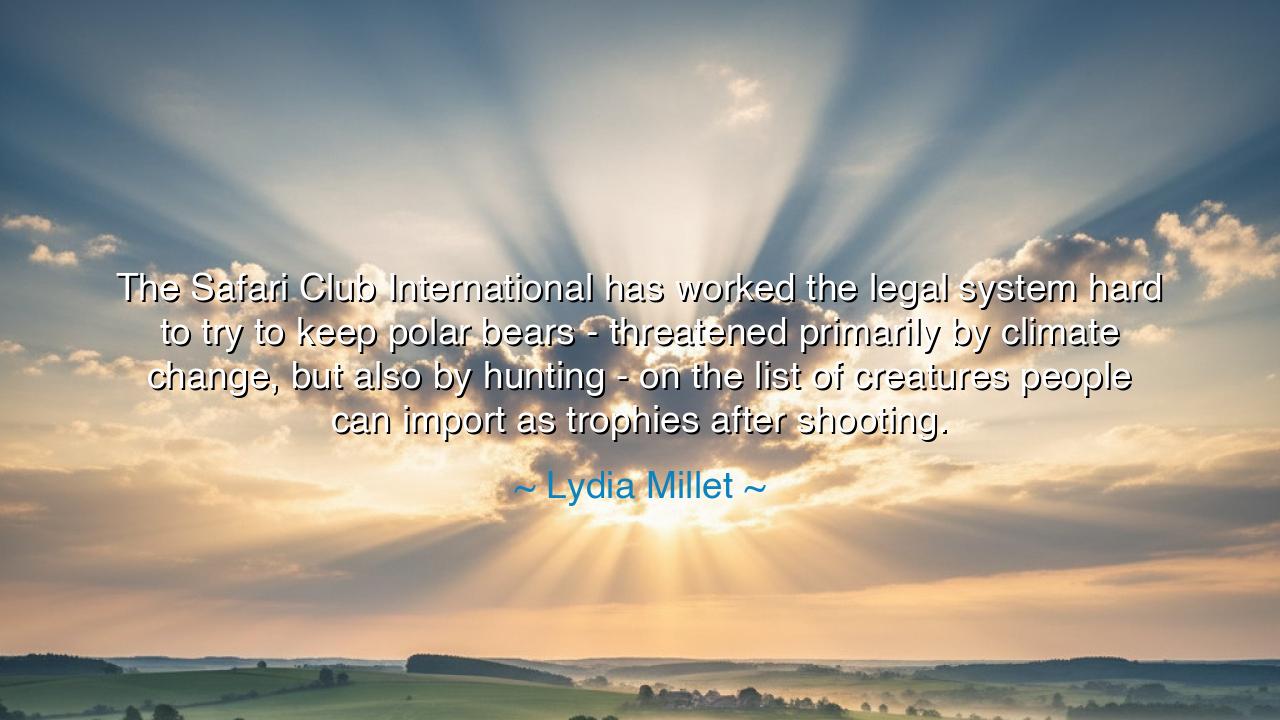
The Safari Club International has worked the legal system hard to
The Safari Club International has worked the legal system hard to try to keep polar bears - threatened primarily by climate change, but also by hunting - on the list of creatures people can import as trophies after shooting.






The words of Lydia Millet carry a somber warning and a call to vigilance: “The Safari Club International has worked the legal system hard to try to keep polar bears — threatened primarily by climate change, but also by hunting — on the list of creatures people can import as trophies after shooting.” Within this statement lies a meditation on the intersection of law, power, and morality. Millet reminds us that legality does not always equate to justice, and that those with resources and influence can manipulate legal structures to preserve practices that endanger life and the natural order.
The origin of this insight lies in the ongoing debate over wildlife conservation and trophy hunting in the United States and abroad. The Safari Club International, representing hunters and the interests of sporting clubs, has leveraged legal mechanisms to maintain the importation rights of certain threatened species, including polar bears. Millet highlights the tension between the letter of the law and the ethical responsibility of society to protect vulnerable creatures. While climate change imperils these majestic animals, human interference — sanctioned through legal maneuvering — compounds their risk.
From the perspective of the ancients, Millet’s observation is a lesson in the power and limits of law. In Rome, magistrates and the Senate often faced pressure from wealthy elites seeking to bend legal interpretations for personal gain, whether in land ownership, taxation, or gladiatorial spectacles. Legal compliance alone did not ensure justice; moral oversight and communal wisdom were necessary to prevent harm. Millet’s words echo this principle: the law can be manipulated, but the moral duty to protect life persists beyond statutes.
Consider the historical example of the passage of the Lacey Act in the United States in 1900, one of the first laws aimed at protecting wildlife from illegal hunting and trafficking. While initially limited in scope, the law reflected a societal recognition that unchecked exploitation could lead to extinction and ecological collapse. Wealthy hunters and industries frequently sought loopholes, yet the law was strengthened over time through activism and legal challenge. Millet’s reflection captures a similar struggle: legal battles are waged not only in courts but in the arena of ethics and public consciousness.
Millet also underscores the interplay between environmental threats and human agency. Polar bears are imperiled primarily by climate change, a global issue driven by industrial activity and carbon emissions, yet hunting and trophy imports represent immediate, tangible threats exacerbated by legal exploitation. The manipulation of legal systems to preserve such practices illustrates how human ingenuity can serve both creation and destruction. The ancients, from Aristotle to Pliny the Elder, cautioned that human power must be tempered with foresight, for the natural world sustains life and civilization alike.
Her words challenge us to recognize the limits of legality as a moral guide. Just because an action is legally permissible does not make it righteous. In history, laws have often lagged behind ethical progress: slavery, colonial exploitation, and environmental degradation were all, at points, legal yet morally indefensible. Millet reminds us that advocacy, awareness, and the pressure of public conscience are essential to ensuring that law aligns with the higher imperatives of justice and sustainability.
The lesson is urgent and universal: vigilance, advocacy, and moral courage are required to protect the vulnerable. Legal frameworks can be manipulated, but the obligation to safeguard life — human or animal — transcends statutes. Millet’s observation encourages citizens and policymakers to question whether legal victories serve justice or merely privilege, and to act decisively when legality conflicts with ethics and ecological stewardship.
Thus, the words of Lydia Millet endure as both warning and guidance: law is a tool, not a moral arbiter. Protecting polar bears and other endangered species demands more than compliance; it requires vigilance, advocacy, and the courage to challenge those who manipulate legal systems for narrow interests. By aligning law with morality and foresight, society honors not only the statutes of the court but the enduring principles of justice and the preservation of life on Earth.






AAdministratorAdministrator
Welcome, honored guests. Please leave a comment, we will respond soon